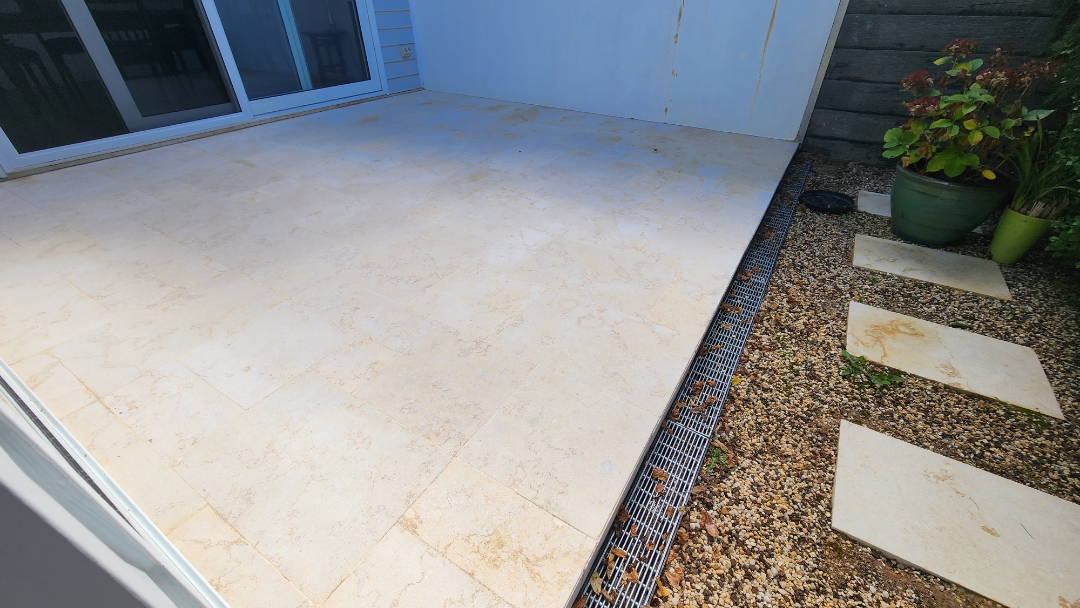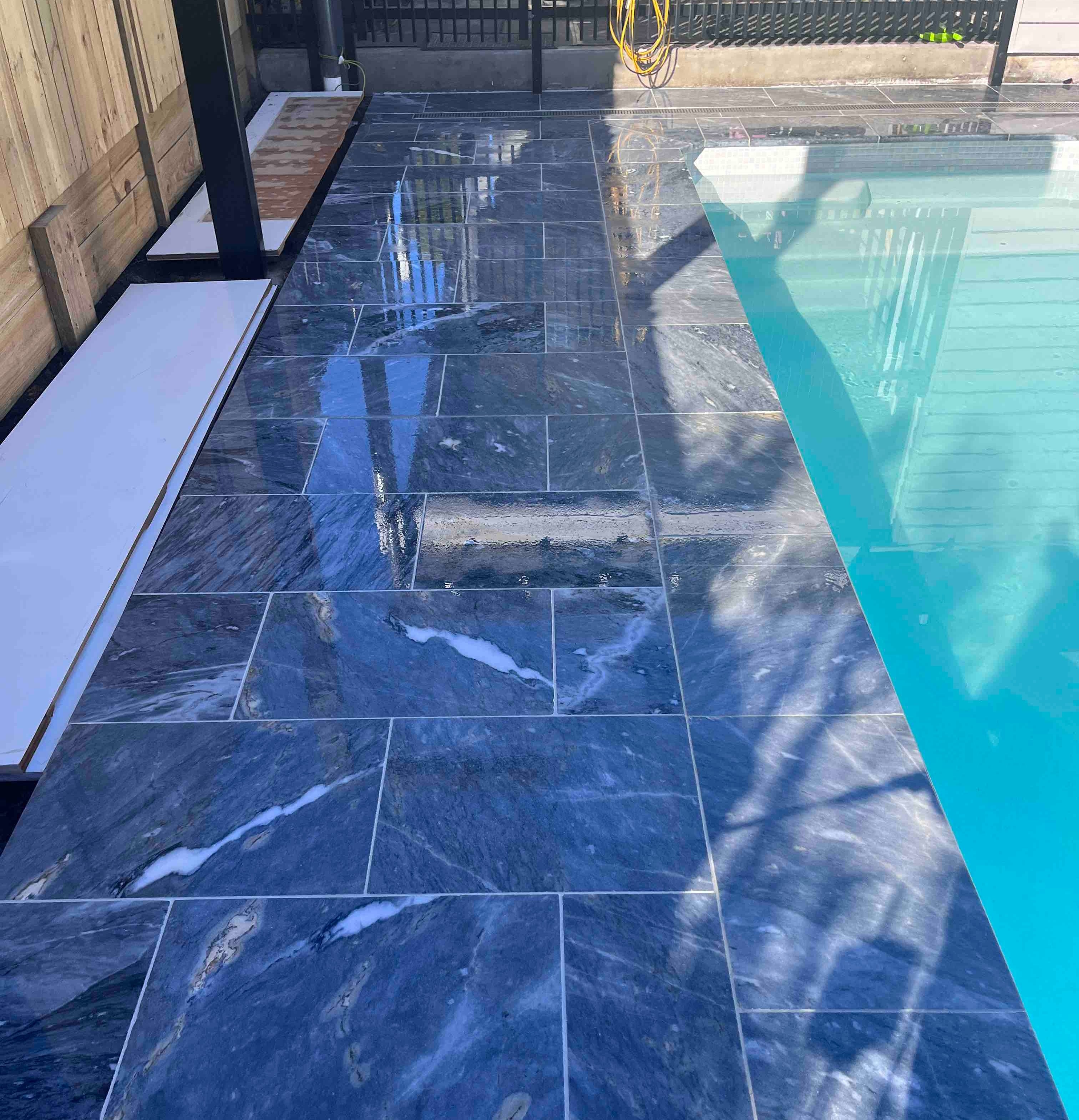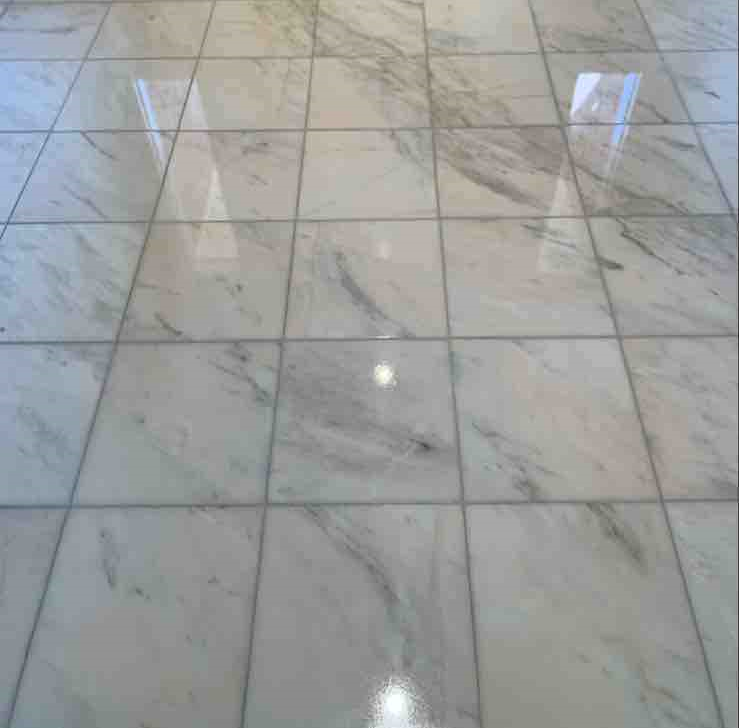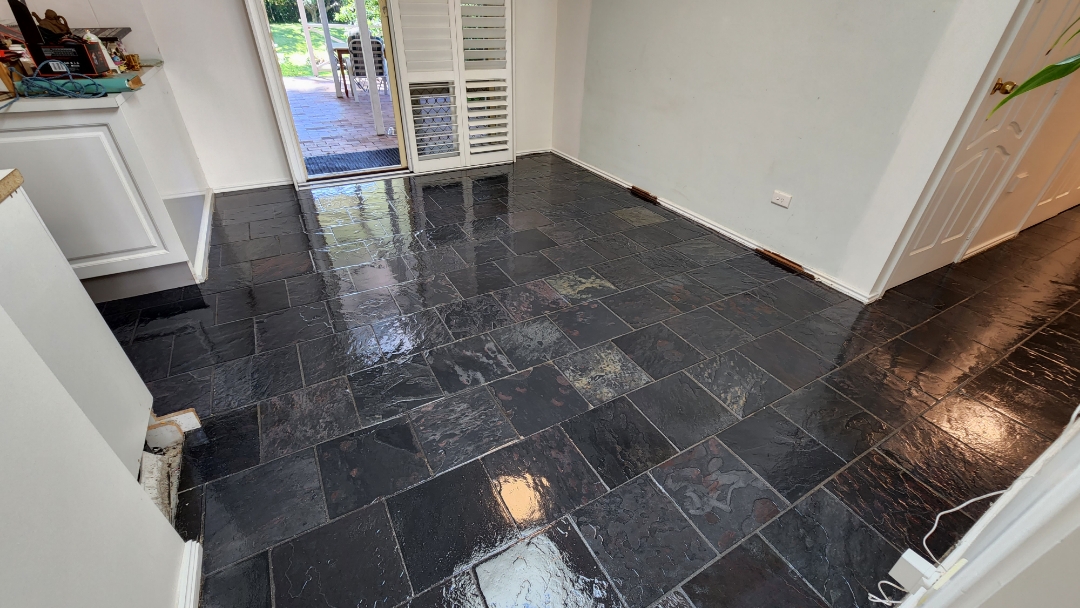- Stone Sealer
- Outdoor Stone Sealer
- Long Lasting Stone Sealer
- Best Stone Sealer
- Sealing Stone Pavers
- Sealing Stone around Pool
- Sealing Stone Kitchens
- Sealing Stone Bathrooms
- Sealing Stone Showers
- Sealing Stone Benchtops
- Protecting against Acid Attack
- Protecting against Salt Attack
- Protecting against Efflorescence
Frequently Asked Questions
+
How can you remove acidic (etch) marks from natural stone tiles?
To remove acidic (etch) marks from natural stone tiles, you should buff the affected area with a series of sanding pads. After successfully eliminating the stains, ensure to seal the natural stone with an impregnating sealer to protect it.
+
Can I use any cleaning solution on natural stone?
?
No, it's not recommended. Natural stone is sensitive to acids and requires pH-neutral cleaning solutions that are specifically formulated for this type of material. It's essential to conduct a test on a small, inconspicuous area before using any cleaning products to ensure they are suitable for your natural stone.
+
Are fumes from sealers dangerous to inhale during application on natural stone?
Yes, it's important to prioritize water-based products, particularly when working indoors or in spaces with inadequate ventilation. Solvent-based sealers not only pose a fire risk but also emit fumes that can be harmful to both health and property.
+
How long will a sealer for natural stone last?
The longevity of a sealer depends on environmental factors and how well the natural stone surface is maintained. Generally, higher-quality sealers offer superior long-term performance. Penetrating sealers typically provide the longest-lasting protection and can endure for up to 15 years before needing reapplication. Conversely, most topical sealers often require more frequent stripping and reapplication.
+
What is a sealer?
A sealer is a protective coating applied to natural stone and other materials to prevent contaminants from penetrating and causing deterioration. Unsealed natural stone is vulnerable to staining and permanent damage. There are two main types of natural stone sealers: penetrating and topical.
+
How do impregnators work on natural stone?
Impregnators, also known as penetrating sealers, penetrate beneath the surface of natural stone to provide protection from within. They do not leave a visible coating or film on the surface. Impregnators work by reducing the pore size of the stone and filling these pores with a resin. These resins are small enough to allow vapor to pass through while still protecting the stone from contaminants.
+
Why is breathability necessary for natural stone?
It is crucial for all types of natural stone to be able to release vapor and "breathe." If the pores of natural stone are completely blocked, vapor can condense within the stone, causing it to become saturated with moisture. Excess moisture can lead to various issues. Additionally, moisture may carry soluble salts, which can cause efflorescence when they deposit on the surface of the stone. If these salts cannot escape to the surface, they will accumulate in the pores of the stone, leading to deterioration.
+
Why is breathability important for natural stone?
It is critical for natural stone to have the ability to release vapor and maintain breathability. When the pores of natural stone are completely blocked, vapor can condense within the material, causing it to become saturated with moisture. This excess moisture can lead to various issues. Additionally, moisture may carry soluble salts, which can cause efflorescence when they accumulate on the surface of the stone. If these salts cannot escape to the surface, they will accumulate within the pores of the stone, contributing to its deterioration over time.
+
Do impregnators sometimes encounter issues?
Problems with impregnators often arise due to improper application. If the impregnator is not thoroughly removed from the surface of natural stone and excess remains, it can cause the stone to feel sticky and necessitate removal. Moreover, solvent-based impregnators might react adversely with certain materials, resulting in cloudiness or discoloration. Additionally, if the natural stone is wet during application, many impregnators may not penetrate effectively, leading to subpar performance.
+
How often should an impregnator be applied to natural stone?
The frequency of application depends on the type and usage of the natural stone. Lower-quality sealers may need reapplication every few years. A transparent penetrating sealer typically lasts up to 10 years, while a high-quality sealer can provide protection for up to 15 years.
+
Are sealers UV resistant when applied to natural stone?
The UV resistance of sealers varies depending on their type. When sealing outdoor areas with natural stone, it's crucial to choose a UV resistant sealer that preserves slip resistance and does not alter the appearance of the stone. Penetrating sealers are generally UV resistant and help maintain the stone's natural characteristics and slip resistance.
+
I have installed a natural stone floor in my house. How do I care for it?
Natural stone floors typically develop surface wear over time. Using a high-quality sealer designed for natural stone can greatly protect the surface from spills and stains. It's recommended to set up an annual maintenance schedule for your floor with a professional cleaning company specializing in natural stone floors. This will help ensure proper care and longevity of your natural stone flooring.
+
Can I apply a sealer to my natural stone floor myself?
While it is feasible to apply a sealer or impregnator to your natural stone floor yourself, it is strongly advised to engage the services of a professional stone floor sealing company. They have the required equipment and expertise to ensure correct application. Improper sealing can markedly affect the appearance and durability of your natural stone floor. It's essential to thoroughly clean the floor, removing any residue and dust, before applying the sealer.
+
How should I handle stains and spills on my natural stone?
Promptly blot spills to prevent permanent damage. Use a damp cloth to gently wipe away spills from water-based substances like tea or coffee, avoiding rubbing the spill. For stubborn stains, using a poultice to draw out the stain is recommended. However, this procedure can be time-intensive and is best managed by professionals who specialize in natural stone care.
+
How can I distinguish between a stain and an etch mark on natural stone?
A spot that appears dark and shaded is typically a stain, while an etch mark will appear dull and may have a slight haze to it.
+
I've had a natural stone floor installed and now there are dull spots over it. What is causing this and how can I address it?
This is commonly known as etching, which occurs when the surface of natural stone becomes corroded, leading to rough, dull marks. Mild etching feels smooth and can often be removed with a polishing powder. However, for more severe cases of etching, it is advisable to seek assistance from a professional in natural stone restoration, such as
StoneMaster, to effectively restore the stone's appearance.
+
I have removed a carpet to discover a natural stone floor. Can it be refurbished?
Yes, it is possible to refurbish a natural stone floor that has been hidden under carpet. You will need to enlist the services of a professional in natural stone restoration to restore the floor to its original beauty.
+
What is acid etching and how can I protect my natural stone against it?
Acid etching occurs when any acidic substance comes into contact with natural stone, causing it to be corroded or etched. Protecting natural stone against acid etching is crucial but challenging due to its porous nature. To safeguard your natural stone, promptly seal and clean up any spills. The high porosity of natural stone makes sealing essential to provide protection against future acid attacks and liquid spills.







